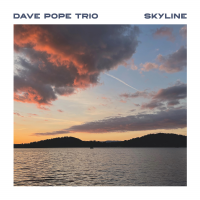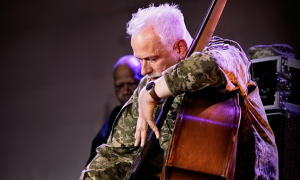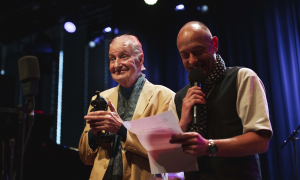Home » Jazz Articles » Profile » Keith Tippett: 100 Best Foots Forward
Keith Tippett: 100 Best Foots Forward


Keith Tippett
piano1947 - 2020
Keith has known Peter Bolton, the festival's artistic director, since Peter managed Southampton's Turner-Sims Concert Hall. "Over the years we'd become friends and he rang and asked if I was interested in writing a piece. I said, 'Yes. I've had this idea for a while and I'd like to use saxophones instead of strings as the ensemble.'" Originally intended for Southampton's Community Choir, when they weren't able to do it, The BBC Singers took on the commission. The half-hour piece, called The Monk Watches The Eagle, features the Apollo Saxophone Quartet and four jazz/Improvising musicians including

Paul Dunmall
saxophoneb.1953

Chris Biscoe
saxophoneb.1947
Ben Waghorn
saxophoneKevin Figes
saxophone, alto
Julie Tippetts
b.1947"It's a title I've had for a very long time and I've wanted to have some music to fit the title. I started writing the piece as usual with no title and Julie was writing something and gave it to me. The title came out of my subconscious into my conscious mind." It's actually very apt with the world premiere in Norwich Cathedral and with the BBC Singers also performing a set of Early music. Peter Bolton decided he wanted to feature Keith at the Festival. They opted for Linuckea, Keith's piano quintet with the Kreuzer String Quartet, "and to show another side of my personality, a chamber improvised music trio with Paul Dunmall and Julie, called the Dartington Trio because the three of us teach Summer School there."
With the Apollo Saxophone Quartet performing another new Tippett composition in Brighton in May, some critics have thought Keith was deserting jazz for contemporary music. He dismisses the suggestion. "Some people said that with Linuckea I've gone Western classical—not in a derogatory way, it was just their observation. But if you put that out with saxophones instead of strings it would be an avant-garde jazz piece. I've no pretensions to be a contemporary Western European classical composer. I'm a jazz musician."
Such comments ignore the fact that Keith has worked with classical musicians since Centipede back in 1971. "I think jazz and improvising musicians like myself have been touching fingers with contemporary musicians for a while now. Centipede, which is well over a quarter of a century ago, nearly everybody in that band was a friend from rock, jazz and Western classical music." And as he points out, the commissions have come from the latter rather than from jazz. "No jazz ensemble has asked me to write anything for them because most jazz musicians write for themselves or play standards. So, it seems the contemporary musicians tend to ask me to write something for them and it's wonderful." Improvisation remains an important element in commissions that have included the Balanescu and Kreuzer Quartets, Ensemble Bash, pianist Julian Jacobson and the Composers Ensemble. "Most contemporary musicians are used to and like to improvise -not over chord changes, just in a freer atonal sense and they're fantastic at it as well. It enables the musician then to be a creator as well as a curator of the ink."
Keith's music has always been rooted in jazz and he traces his first enthusiasm for the music back to

Kenny Ball
b.1930
Acker Bilk
clarinet1929 - 2014
He moved to London in 1967. "I didn't play much then because I didn't know anybody. Eventually when I connected up with people I started playing and I was writing my own pieces by then and it certainly wasn't jazz-rock. We might've been doing a couple of pieces with eight fills but the sextet was never really part of the English jazz-rock scene like
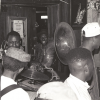 "
data-original-title="" title="">Back Door or "
data-original-title="" title="">Nucleus." His group included
"
data-original-title="" title="">Back Door or "
data-original-title="" title="">Nucleus." His group included 
Mark Charig
trumpetb.1944
Nick Evans
tromboneb.1947

Elton Dean
saxophone1945 - 2006

Jeff Clyne
bass, acoustic1937 - 2009
Alan Richard Jackson
b.1940
John Marshall
drumsb.1952
It also defined Keith as a very particular kind of jazz musician, a disrespecter of boundaries. As he says, "I didn't want to be involved in any school or somebody trying to create a dynasty. I didn't want to be part of that." The massive Centipede took that process several steps further in what was, for jazz at least, a hugely successful work critically and financially. "We got a lot of publicity in the Daily Mirror and Melody Maker and RCA picked up on it. Suddenly, we were flying to Bordeaux and Holland in our own aeroplane. " data-original-title="" title="">Centipede was at the Albert Hall when I was 22. In the '80s I wasn't even part of the furniture. Myself and others like me were forgotten, yet I was the

Courtney Pine
saxophoneb.1964
With

King Crimson
band / ensemble / orchestrab.1969

Robert Fripp
guitarb.1946

Andre Previn
piano1929 - 2019

David Bowie
vocals1947 - 2016
Rather than join King Crimson full-time or deliver Centipede II as RCA wanted, Keith opted for the more intimate Ovary Lodge with Frank Perry and

Roy Babbington
bass, electricb.1940

Larry Stabbins
saxophoneb.1949
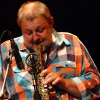 "
data-original-title="" title="">Mujician, the improvising group he shares with Paul Dunmall, Paul Rodgers and
"
data-original-title="" title="">Mujician, the improvising group he shares with Paul Dunmall, Paul Rodgers and 
Tony Levin
bassb.1946
Keith's work and career now seem so diverse, it's hard to appreciate just how rough the Thatcher years were for him. By then he was established in Europe and work with people like

Peter Brötzmann
woodwinds1941 - 2023

Peter Kowald
bass, acoustic1944 - 2002
In fact, his solo performances—and exceptional records for FMP -came about because it was a way of working with low overheads. Even piano duets, which have included his marvellous albums with

Stan Tracey
piano1926 - 2013

Howard Riley
pianob.1943

Herbie Hancock
pianob.1940

Chick Corea
piano1941 - 2021
Drummers also feature significantly in Keith's musical world. As well as working with the brilliant Tony Levin in Mujician, still perhaps his first among equals, Keith has performed and recorded with 'blood-brother'

Louis Moholo-Moholo
drums1940 - 2025
Peter Fairclough
drumsb.1956
Mention of Louis Moholo, brings us to Keith's role in the " data-original-title="" title="">The State of Bengal Dedication Suite and its celebration of the music of the " data-original-title="" title="">Blue Notes and the
Brotherhood of Breath
band / ensemble / orchestrab.1969
Chris McGregor
b.1936"I'm sure there were other pianists who could have done it as well but thank you for the compliment. I loved the Brotherhood. Julie and I used to go and listen to them wherever they played in London and I used to play with Mongs (
Mongezi Feza
trumpet
Dudu Pukwana
saxophoneb.1938
Harry Miller
bassb.1941
Keith acknowledges that he and McGregor did have shared influences in their approach to writing and jazz piano. Chris' father was a Pastor in South Africa, while from the age of five Keith was a member of the choir of St. Thomas the Martyr Beckett Church in Bristol. "When my voice broke, I studied church organ for three years. All the time I was studying piano and when I went to secondary school I learnt the cornet, then moved to the tenor horn and became first horn with the Bristol Youth Brass Band." There's probably a book to be written about the importance of church and brass band music in the development of British jazz after WWII. In a sense, this was our Gospel music.
There's one other project very close to Keith's heart -his new big band, Tapestry. Keith fears the band will die if they don't do a gig this year. "It's mostly people who played with Centipede or the Ark —Tony Levin and Louis Moholo sitting side by side. I'd pay just to hear them. Larry Stabbins,

Henry Lowther
trumpetb.1941
 "
data-original-title="" title="">Pino Minafra and
"
data-original-title="" title="">Pino Minafra and 
Gianluigi Trovesi
saxophoneThere are a couple of 'rough and ready' concert recordings floating around but something like this needs the clarity of studio sound to reveal the glorious architecture inside the music. Yet I leave feeling optimistic that you'll be hearing it soon on a stereo near you -perhaps because for all the hard times Keith, and Julie, have hung in there. As he says, "This is the way I contribute to society for what it's worth. This is what I do. I'm a pianist, a composer and an educator. You get some people who don't compose and some who do and some people who teach and don't want to perform. I really love it all. But first and foremost I'm a performer—I like the smell of the crowd and the roar of the greasepaint."
Keith Tippett's Top Five

Keith Tippett Group
You Are Here...I Am There (disconforme)
There's sadly nothing by the KT Trad Lads currently available but really it began here and here you should begin if you think Tippett's music is difficult. Not jazz-rock perhaps but definitely in tune with the times. Great stuff.

Keith Tippett's Ark
Frames: music For An Imaginary Film (Ogun)
Why this rather than Centipede? Well, I wouldn't part with either but maybe the pairings work better. Stan Tracey/Keith Tippett, Frank Perry/Louis Moholo, Julie Tippetts/" data-original-title="" title="">Maggie Nichols. Great words from JT as well. And the saxophones went in two by two and the drummers and....

Peter Fairclough/Keith Tippett
Imago (jazzprint)
Simply brilliant duo record. The title track at 45 minutes long? Should be longer, goddamit!

Keith Tippett's Tapestry
Live at Le Mans (Redeye)
Fabulous music, stellar band.

Mujician
The Bristol Concert (Whatjazz)
There are better Mujician records but for so many other reasons this is astonishing. The group plus Julie have just two weeks to lick these Georgian musicians into shape. Will they make it in time for the gig? Would've made great Reality TV—instead we get Will Young and Jordan. Bastards!
Keith Tippett's Side Work

Elton Dean's Ninesense
Live At The BBC (Hux)
A bunch of mates -Louis, Harry, Elton, Marc, Nick, Skid et al—make ecstatic music together.


Trevor Watts
saxophoneb.1939
Innovation (FMR)
Perhaps the best edition of Amalgam. Worth it for Keith's contribution alone.

The Dedication Orchestra
Ixesha (Ogun)
This is why only Keith could try to fill the Mighty McGregor's shoes. Check out Dudu's lovely ""Angel Nomali." It still hurts that these guys are no longer with us.

King Crimson
In The Wake of Poseidon (Island)
Robert Fripp played with Centipede and produced the album. Keith returns the favour. In America, they heard this and went ape! From TOTP to the potato fields of Gloucestershire.
This article first appeared in Jazzwise in 2009.
Tags
Profile
Keith Tippett
Duncan Heining
Paul Dunmall
Chris Biscoe
Ben Waghorn
Kevin Figes
Julie Tippetts
Kenny Ball
Acker Bilk
Back Door
Nucleus
Marc Charig
Nick Evans
Elton Dean
Jeff Clyne
Alan Jackson
John Marshall
Centipede
Courtney Pine
King Crimson
Bob Fripp
Andre Previn
Arthur Brown
Alan Price
Zoot Money
David Bowie
Ovary Lodge
Frank Perry
Roy Babbington
Larry Stabbins
Mujician
Paul Rodgers
Tony Levin
Stan Tracey
Howard Riley
Herbie Hancock
Chick Corea
Louis Moholo
Peter Fairclough
Dedication Orchestra
Blue Notes
Brotherhood of Breath
Chris McGregor
Mongesi Fesa
Dudu Pukwana
Harry Miller
Henry Lowther
Pino Minafra
Gianluigi Trovesi
Maggie Nichols
Trevor Watts
Amalgam
Comments
PREVIOUS / NEXT
Support All About Jazz
 All About Jazz has been a pillar of jazz since 1995, championing it as an art form and, more importantly, supporting the musicians who make it. Our enduring commitment has made "AAJ" one of the most culturally important websites of its kind, read by hundreds of thousands of fans, musicians and industry figures every month.
All About Jazz has been a pillar of jazz since 1995, championing it as an art form and, more importantly, supporting the musicians who make it. Our enduring commitment has made "AAJ" one of the most culturally important websites of its kind, read by hundreds of thousands of fans, musicians and industry figures every month.



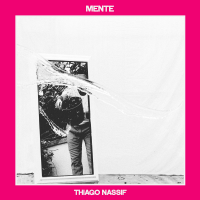

 Buy Now
Buy Now



